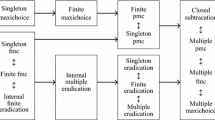Abstract
In this paper we investigate AGM belief contraction operators by using the tools of algebraic logic. We generalize the notion of contraction to arbitrary finitary propositional logics, and we show how to switch from a syntactic-based approach to a semantic one. This allows to build a solid bridge between the validity of AGM postulates in a propositional logic and specific algebraic properties of its intended algebraic counterpart. Such a connection deserves particular attention when we deal with maxichoice contractions, as studied in the final part of the paper.
Similar content being viewed by others
References
Alchourrón, C., & Makinson, D. (1982). On the logic of theory change: Contraction functions and their associated revision functions. Theoria, 48(1), 14–37.
Alchourrón, C.E., Gärdenfors, P., & Makinson, D. (1985). On the logic of theory change: Partial meet contraction and revision functions. The Journal of Symbolic Logic, 50(2), 510–530.
Burris, S., & Sankappanavar, H.P. (1981). A course in universal algebra. Springer.
Czelakowski, J. (1984). Filter distributive logics. Studia Logica, 43(4):353–377.
Doyle, J. (1991). Rational belief revision (preliminary report). In Proceedings of the second international conference on principles of knowledge representation and reasoning (pp. 163–174).
Flouris, G., Plexousakis, D., & Antoniou, G. (2006). On generalizing the agm postulates. In proceedings of the 2006 conference on STAIRS 2006: proceedings of the third starting AI researchers’ symposium (pp. 132–143): IOS Press.
Font, J. (2016). Abstract Algebraic Logic: An Introductory Textbook. College Publications.
Font, J.M., & Jansana, R. A general algebraic semantics for sentential logics, volume 7 of Lecture Notes in Logic. A.S.L., second edition 2017 edition, 2009. First edition 1996. Electronic version freely available through Project Euclid at http://projecteuclid.org/euclid.lnl/1235416965.
Galliers, J.R. (1992). Autonomous belief revision and communication. In Gärdenfors, P. (Ed.) Belief revision, Cambridge tracts in theoretical computer science (pp. 220–246): Cambridge University Press.
Gärdenfors, P. (1984). Epistemic importance and minimal changes of belief. Australasian Journal of Philosophy, 62(2), 136–157.
Gärdenfors, P. (1992). Belief revision: An introduction. In Gärdenfors, P. (Ed.) Belief revision, Cambridge tracts in theoretical computer science (pp. 1–28): Cambridge University Press.
Fermé, S.E., & Hansson, D.O. (2018). Belief change: introduction and overview. Springer.
Hansson, S.O. (1991). Belief contraction without recovery. Studia Logica, 50(2), 251–260.
Kowalski, T. (2004). Semisimplicity, edpc and discriminator varieties of residuated lattices. Studia Logica, 77(2), 255–265.
Lévy, F. (1994). A survey of belief revision and updating in classical logic. International Journal of Intelligent Systems, 9(1), 29–59.
Makinson, D. (1985). How to give it up: A survey of some formal aspects of the logic of theory change. Synthese, 62(3), 347–363.
Makinson, D. (1987). On the status of the postulate of recovery in the logic of theory change. Journal of Philosophical Logic, 16, 383–394.
Moretto Ribeiro, M. (2013). Belief Revision in Non-Classical Logics. London: Springer.
Rott, H. (1992). Preferential belief change using generalized epistemic entrenchment. Journal of Logic, Language and Information, 1(1), 45–78.
van Ditmarsch, H., van der Hoek, W., & Kooi, B. (2007). Dynamic Epistemic Logic, 1st edn. Berlin: Springer Publishing Company, Inc.
Acknowledgments
We thank Hector Freytes, Roberto Giuntini, Antonio Ledda, Francesco Paoli, Antonino Salibra and Giuseppe Sergioli for the insightful discussions on the topics of the present paper. We also thank an anonymous referee for the significant suggestions which helped to improve the paper. The authors gratefully acknowledge the following funding sources: Regione Autonoma della Sardegna, within the project “Per un’estensione semantica della Logica Computazionale Quantistica - Impatto teorico e ricadute implementative”, RAS: SR40341; MIUR, project PRIN 2017 “Theory and applications of resource sensitive logics”, CUP: 20173WKCM5; “Logic and cognition. Theory, experiments, and applications”, CUP: 2013YP4N3; Fondazione di Sardegna, within the project “Resource sensitive reasoning and logic ”, CUP: F72F20000410007.
Author information
Authors and Affiliations
Corresponding author
Ethics declarations
Conflict of interests
The authors declare that they have no conflict of interest.
Additional information
Publisher’s Note
Springer Nature remains neutral with regard to jurisdictional claims in published maps and institutional affiliations.
Rights and permissions
About this article
Cite this article
Fazio, D., Pra Baldi, M. On a Logico-Algebraic Approach to AGM Belief Contraction Theory. J Philos Logic 50, 911–938 (2021). https://doi.org/10.1007/s10992-020-09587-0
Received:
Accepted:
Published:
Issue Date:
DOI: https://doi.org/10.1007/s10992-020-09587-0




